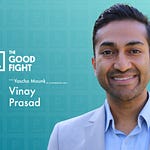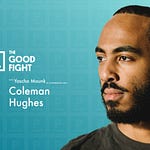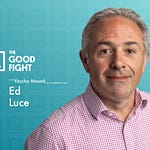Joshua Coleman is a psychologist and senior fellow at the Council on Contemporary Families. He is the author of Rules of Estrangement: Why Adult Children Cut Ties and How to Heal the Conflict.
In this week’s conversation, Yascha Mounk and Joshua Coleman discuss why there is a growing number of estrangements between parents and their adult children, how political identification has increasingly become a source of family conflict, and the best strategies for how estranged parents and adult children can heal their relationships.
The transcript has been condensed and lightly edited for clarity.
Yascha Mounk: You've done some really fascinating research, which, at first sight doesn't feel like it's of direct political relevance, but which I think says a lot about our society and perhaps about our political moment as well. It’s about the striking extent to which adult Americans lose touch with their parents. How frequent is this? How many adult Americans have very little contact with their parents?
Joshua Coleman: The current estimates, based on a number of wide-ranging studies, show that it's around 10% with mothers and close to 20% with fathers. One large study out of Cornell found that 27% of adult children over the age of 18 have no contact with some family members. One survey of mothers found that of those mothers who are 65 to 75 years old, with at least one living adult child, 11% were estranged from one child.
Mounk: What do you think explains this? Is this new?
Coleman: I think it is relatively new. We've always had estrangements and conflicted relationships between parents and adult children. But I think it is relatively new to view cutting off contact with family members, your parents in particular, as an expression of personal growth and identity, and a form of protecting your mental health. Today, cutting off a parent can be a marker of existential courage or identity or self-definition, whereas I don't think that was nearly as true in the past. With parents and adult children today, the adult child feels like, “If you failed me in your responsibility as a parent”—in ways, of course, that are increasingly hard to define—“then I owe you nothing as an adult child.” I think that that explains a lot of the estrangements and low parent-child contact that aren't explained just by abuse or toxic behavior.
Mounk: You sometimes hear people say about romantic relationships, that one of the problems with an overly romantic conception of partnership is that you start to assume that your partner needs to fulfill you, make you happy, be your soulmate and all of those things. And when they inevitably fail to live up to that, that leads to relationship instability, because you say, “Well, if you're not fulfilling me every day, then you must be the wrong person.” Is there a sort of odd parental parallel here?
Coleman: I'd say it's completely parallel. It has to do with what the British sociologist Anthony Giddens refers to as the evolution of “pure relationships.” Giddens writes that as our identities became disembedded from the institutions that have governed family life for millennia—like religion, gender, community, neighborhood, and so on—we began to develop what he calls “pure relationships.” This is the idea that our relationships are purely constituted upon the principles of intimacy: Does this relationship feel good, or does it feel bad? Has it advanced my feelings of identity and well-being, or does it inhibit those? And that’s not only true in romantic relationships; it’s come to define relationships between parents and adult children, so that today, nothing obligates or guarantees the relationship between a parent and adult child beyond whether or not that adult child wants that relationship. And on the one hand, that can make the relationship good or strong, because parents are working much harder than they ever have to have a good relationship. On the other hand, it makes it much more fragile, because if the adult child feels like the parent’s behavior isn't in line with their ideals for happiness and mental health, then they're much less likely to see this parent or spend time with them.
Mounk: And how does that relate to the concept of a therapeutic culture, and the role that psychotherapy might play?
Coleman: Today's therapists are really the high priests that make these decisions about who to have or not have in your life. The definition of what's considered healthy has also radically changed. For an earlier generation, say, pre-1960, the role of a therapist was probably to help the adult child to have stronger family values and to be more in line with ideals around duty and responsibility. Today, by contrast, notions like duty, obligation, or even caretaking, guilt, or shame—those are all considered to be potentially problematic obstacles on the path to self discovery. So from my perspective, there has been a shift in the moral framework away from “Honor thy mother and father” and “respect your elders,” to a much more personal psychological perspective of health.
The other moral framework that's emerged is this idea of, “I have to only have relationships that are protective of my mental health.” That’s something that I hear a lot from adult children about their parents: “I can't have you around me or my children, because it's not good for my mental health.” Now, on the one hand, fair enough, right? Nobody wants anybody in their life that's problematic to their mental health. But the idea of what causes mental illness is also highly problematic. We still live in a culture that's very captured by a psychoanalytic, psychodynamic definition of adult outcomes, where we assume that if you arrive into adulthood with significant anxiety or depression or low self-esteem, then it can all be dialed back to hidden or prior traumas or family relationships. The Israeli sociologist Eva Illouz says, “What’s a dysfunctional family? It's a family where your needs weren't met. How do you know that your needs weren’t met? By looking at your present condition.” So, if you have problems, you assume that it has to do with your parents—and sure, sometimes it does. But it’s also random good luck, random bad luck, genetics, cohort, siblings, and other important relationships.
We have enormous problems in this country with social isolation, loneliness, depression, and high rates of mental illness, and that’s partly because we are increasingly atomized. We are cutting off not only friends, but family members and parents. And a lot of the parents in my practice are really willing to “do the work.” If they're willing to go to therapy, they're willing to make amends for their mistakes. And the adult children are saying, “No, since you failed me, I owe you nothing.” And I think that’s a very problematic way to run a society.
Mounk: How deep do you think this problem of social isolation goes in the United States? Is it connected to the broader sense of malaise and anger that we have in the country at the moment?
Coleman: We're becoming increasingly atomized; our definitions of what constitutes a good relationship makes us very fragile. The notion of boundaries, however useful they are, means we're constantly evaluating whether a relationship is good or bad for us. That puts enormous pressure and stress on the self. It also creates a lot of anxiety. So everybody's sort of looking for their tribe, but tribes can be very fragile, and they aren't necessarily able to provide the kind of corrective feedback that we all need, and that we're more used to getting from family and closest friends. Now, this isn't to idealize the family, because I think, to your point, families can be very hurtful and disruptive and traumas are a real thing and can occur in families. It's just that what is considered to be traumatic, harmful, abusive or neglectful behavior today, has radically changed. There was an important article by the Australian psychologist Nick Haslam, who talked about how in the past three decades, there's been an increasing “concept creep” in terms of what we define as being harmful, abusive, neglectful behavior. On the one hand, that's great. It provides us a much more detailed way to talk about feeling injured or hurt or misunderstood by others. On the other hand, it pathologizes the fairly normal slings and arrows of family life, and it presents an idealization of the possibilities of parenthood that isn't very realistic.
Every day there's some new article like “10 Signs That You're with a Narcissist,” “How to Deal with a Narcissist,” or “Why You Should Go No-Contact with Your Parent.” These things give a kind of a legitimacy or authority to cutting off people for reasons that, in other generations, would have been considered obnoxious, maybe irritating or burdensome. But the idea that you should just be constantly wiggling out of problematic relationships because they're upsetting to you is very problematic. And we're constantly confusing conflict with abuse. So many things today get called abusive which are just conflictual. And the difference between them is that if you conceptualize something that's conflictual, then there is a remedy for it. We can sort of assume that there's a pathway. But if you consider it as just abuse, narcissism, borderline personality disorder or any of those things, you've essentially dehumanized the other person, and you've also closed off the possibility that the relationship can be healed.
Mounk: This is something that you see often in areas of social life as well, right? Countries go too far down one path politically, which has the effect of making them soon swing exactly the other way politically. It's very plausible to me that an extreme form of helicopter parenting makes the child feel constrained, and if they don't know how to fight for their space, then the only way they might have to do it is to say, “I'm cutting you off completely.”
If parents of young children are listening to this, what advice do you give them for the next years and decades to minimize the likelihood of this adverse outcome? To put it more positively: how can they maximize their chances of having a meaningful relationship with their adult children in the future?
Coleman: I think the answer is for those parents to recognize that, as their child becomes an adult, their capacity to influence them is significantly reduced; that in the same way research shows that long-term romantic relationships have friendship as their core, that principle can be true of our adult children as well. Now, it's problematic when you're raising young children, because you don't necessarily just want to be your child's friend. You have to have your own authority, autonomy, and ability to set limits. And I think many parents are very confused about what's an abusive set of limits versus a reasonable set of limits. But in general, holding true to the idea that the ground has shifted, and you can't guilt-trip your children into a relationship with you, it has to be in line with their ideals, which may be to spend less time with you, to be more separate from you. The good news about all of this is that the majority of parents today say they feel closer to their adult children than they believe that their parents felt to them, and many parents have really close confiding relationships with their adult children. That's the good news: parents have become much more psychological, invested, conscientious and educated about child-rearing, which has produced much better parent-adult child relationships. The downside is that the adult child now has much more power to set the terms of the relationship when they're grown, and that makes the parents’ authority much more diminished in ways which aren’t necessarily good for either party.
Mounk: What advice would you give to parents of teenagers or adult children who feel their kids pulling away? What is the best way to preserve or to hope to improve the relationship under those kinds of circumstances?
Coleman: Well, one of the things that I talk a lot about with parents, particularly if they're estranged or on the path to estrangement, is to really empathize with what the child is saying. Assume that your child has good reasons for their behavior. So, if a child has cut off contact, I commonly advise parents to say something like, “I know that you wouldn't do this unless it was the healthiest thing for you to do.” Now, from the parents’ perspective, it isn't the healthiest thing for them to do. But from the adult child's perspective, it is. So the parent has to form some kind of an alliance with what the child is doing and why they feel like they need to do it. Part and parcel of that is making amends for the mistakes that the parent has made. Even highly conscientious, educated, caring, loving parents could still, in many ways, have made mistakes that were problematic for their adult child, which the adult child felt, when they were younger, were hurtful, problematic, or disruptive for them. Helping parents to take responsibility, to make amends, to not be defensive or not explain away their actions—I find that to be the most powerful behavior that a parent can do towards reconciliation.
Mounk: Do you see any kind of patterns in what types of families—whether that is by income, by education, by political ideology, by geography, by culture of origin—end up with those kinds of estrangement?
Coleman: In terms of my research, it's primarily Euro Americans, white, middle class families and above. I very rarely see Latino or African American families. I'm seeing more Asian families, but I'd still say that they're fairly rare. We don't have great international statistics about the estrangements, but I would argue that in general, you're going to see less of that in countries that have preserved a sense of filial obligation. Politics are increasingly becoming a cause of estrangement. I read one study that said that something like 1/3 of families have become estranged over political differences. And that's important because politics have become such a powerful defining factor of identity—e.g. who is my tribe and who isn't my tribe. The fact that this extends to families is relatively new. 20 years ago, people weren't getting estranged or even having that much conflict about political differences, whereas today, they do.
Mounk: If you're saying something like: a therapeutic culture is one of the causes of people being overly quick on the trigger towards estrangement, I would assume (though that itself may be wrong) that this kind of therapeutic culture is most widely spread in metropolitan, affluent America—which is, of course, also more liberal-progressive.
Wouldn't you expect some kind of ideological differences, where people who self-define as left-wing would be more likely to undergo estrangement? And if that's not the case, doesn't that somewhat undercut the therapeutic hypothesis?
Coleman: It's an interesting question. Politically, it seems fairly distributed to me. It may be more a matter of class than of politics. I certainly have plenty of conservatives in my practice who are being estranged by their children who are also conservatives. And the therapeutic culture, I think, is an outgrowth of individualism, and there are different types of individuals. For example, the sociologist Amy Schalet contrasted American individualism versus Dutch individualism in her book Not Under My Roof. What she found was that American individuals are more likely to follow what she described as “adversarial individualism,” which is the concept that you become an adult through an adversarial relationship with your parents. Whereas in Dutch societies, they're much more likely to drink with their adolescent children or allow them to have an overnight stay with their boyfriends or girlfriends, starting at the age of 16 or 17. In the United States, it's “not under my roof.” So, I think in some ways, the most important factor is the kind of individualism per se, rather than the political spectrum. But I could be wrong—we don't have great statistics on that yet.
Mounk: You mentioned earlier that one of the drivers of estrangement is the spouse of a child. Now, of course, sometimes the spouse of a child may be the person who helps them realize that their parents really are toxic and abusive. So there can be a positive element to that, again. I'm not trying to imply that estrangement is always a bad thing. But also, of course, a lot of the time, it can be the spouse of a child who is a toxic person, who is jealous of a relationship that spouse might have with their parents and so on. Do parents have any kind of agency in empowering their children to make better choices?
Coleman: I think you have to accept that you don't have very much control over who your child chooses. And a lot of estrangements happen as a result of the parent voting against that potential boyfriend or girlfriend early on, and being critical of them or worried about them. And it’s problematic when that becomes interwoven with the child's own desires to be autonomous and to say, “Well, this is my life. I get to choose who I want to choose and love who I want to love.” So I strongly encourage parents to be very circumspect, and not to say anything critical about somebody's potential spouse, and to be very cautious, even if it's just somebody that they're dating. That can have very problematic consequences later down the line.
Mounk: Undoubtedly, given the numbers, there are many people listening to this podcast who are estranged from their parents or considering becoming estranged from their parents. Perhaps, there are also parents who feel that they would like to have much closer contact with their children than they do. What is your advice to them?
Coleman: The advice for the parent is to find the kernel of truth, if not the bushel of truth, in your child's complaints; to show empathy and compassion; to assume that if they're complaining about you, there may be good reasons for that that you don't understand; to be committed to understanding, and to taking responsibility for the mistakes that you made; to adhere to the principle of separate realities, which means that you could have objectively done a good, dedicated job as a parent, yet your child may still feel like you didn't do the things that they really needed, or wanted you to do. I think those are really the most important principles towards healing a fractured relationship with an adult child.
Mounk: How should children assess whether or not seeking that kind of estrangement is the right course of action for them?
Coleman: I think the issue is whether they have done their due diligence. I don't, as with you, think that all estrangements are bad. I think that some parents are so unrepentant or critical and negative or hostile, that the adult child in these cases does have to choose their own mental health over the relationship with the parent. But I think it's important for the adult child to do due diligence, to give the parent the opportunity to heal the relationship, to do family therapy, and to approach the complaints that they have about the parent in a way that makes it possible for the parent to hear and respond. You're not going to get a great response from your parent if you enter it saying that they're toxic or narcissistic, or that they have a borderline personality disorder. You're just going to shut down the conversation. It's far better to start with what you like or appreciate about the parent, and also to be mindful that parents really do the best that they can, even if that best is terrible. If your parents did fail you in important ways, it's probably because of their own childhood traumas or their own genetics or life circumstances or who they were married to. And so, to have a certain degree of compassion for that doesn't mean that you have to accept whatever they say in terms of the relationship. It means providing a framework where the relationship can be actually healed and moved forward.
Mounk: What would you say to those estranged from a parent, or with very low contact, who may be thinking, “How can I build on that contact in a way that's sustainable, where I don't invite my parent to rush back into my life and overwhelm me so that I feel the need to put these very extreme boundaries back up?”
Coleman: When I work with parents and adult children in reconciliation therapy, that's very much the model. I tell parents that they have to defer to the adult child's pacing, in terms of frequency of contact and the quality of the contact, which may mean that the parent has to not say anything remotely critical or give advice about parenting, or say anything about the daughter- or son-in-law. I think that it's reasonable for the adult child to say that they want to be in control of the pacing. I always tell parents to take that deal, because it's the only way to begin the process of healing.
I support the adult child's boundaries, almost whatever they are. But it becomes problematic when the adult child wants the parents to make amends for things that the parent strongly believes never occurred. That's often the most problematic territory. If the adult child is considering reconciliation, then it's good to give the parent things that they can actually respond to, to find some degree of shared reality. That doesn't mean that the adult child has to accept the parent’s version of their childhood—they can still believe what they believe and maintain that the parent is denying things that occurred. But if the adult child is open to having a reconciliation, then I think that they do get to set the terms, even if the parent feels that those terms are very limiting.
Mounk: Do you think that these trends are going to continue and accelerate, or is there any hope for a change in the culture whereby we might see a reestablishment of family bonds and the strengthening of these lifelong relationships?
Coleman: To me, it seems like we're getting more and more atomized, more and more anxious, more and more agitated. And those things tend to breed more conflict in families and more division. I wish I could end on a really hopeful note about this. But if I were to predict a trend, I would predict a continuation of a trend in the wrong direction.
Still, you're having podcasts like this, and there's more information out there about how to reconcile. And, you know, many of the things that cause estrangement are fixable. Perhaps, if that awareness becomes much more a part of the popular culture, the trend will slow down.
Please do listen and spread the word about The Good Fight.
If you have not yet signed up for our podcast, please do so now by following this link on your phone.
Email: podcast@persuasion.community
Podcast production by John T. Williams and Brendan Ruberry. Podcast cover image by Joe O’Shea.
Connect with us!
Twitter: @Yascha_Mounk & @JoinPersuasion
YouTube: Yascha Mounk, Persuasion
LinkedIn: Persuasion Community
















Why More and More Children are Cutting Off Their Parents